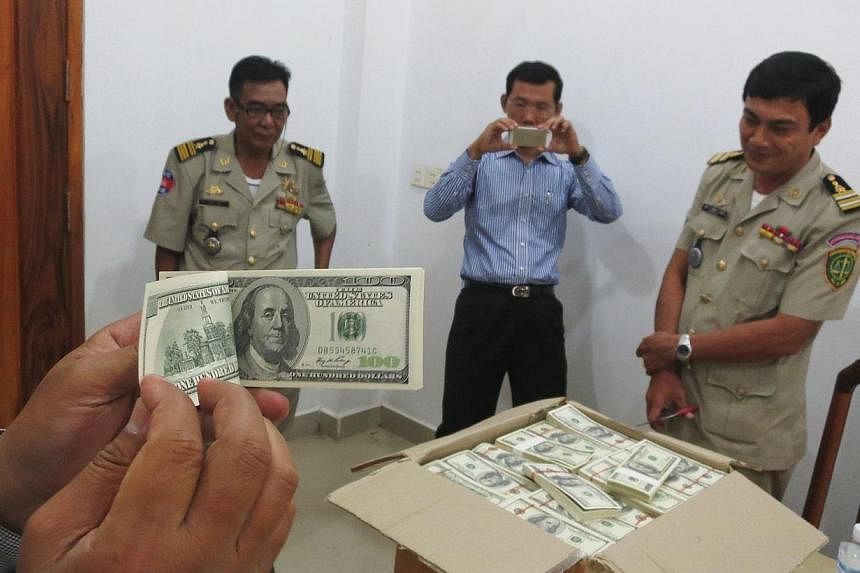BATTAMBANG, Cambodia (Reuters) - Brigadier General Sar Theth is the police chief of Battambang, a languid riverside town in western Cambodia. You could also call him the seven million dollar man.
On Sept 19, Sar Theth's officers tracked three Thai men in a pick-up truck as it passed through a remote border checkpoint from Thailand. When the truck stopped in the Cambodian district of Phnom Proek, the police pounced.
Inside, said Sar Theth, they found three cardboard boxes packed with US$7.16 million (S$9.1 million) in counterfeit hundred-dollar bills, the largest seizure of fake US notes in Southeast Asia for about a decade and the biggest ever in Cambodia.
"If I close my eyes and touch it, I wouldn't know it was fake," he said, rubbing one of the seized notes between thumb and forefinger at Battambang police headquarters.
According to the US Secret Service, whose agents investigate financial crime worldwide alongside their better-known role as presidential bodyguards, the huge bust points to a well-oiled and growing counterfeit operation in neighbouring Thailand, where identical notes had previously been seized.
The alleged involvement of Thai military personnel - the three men arrested were serving or former officers of the Royal Thai Navy - could also embarrass Prime Minister Prayuth Chan-ocha. A former general, Prayuth seized power in a May 22 military coup and has vowed to crack down on organised crime.
The men deny any wrongdoing, and the Thai navy said it was awaiting the conclusion of the investigation before deciding whether to take any action.
There is more than US$1 trillion cash in global circulation, three-quarters of it outside the United States, according to the Secret Service. Tackling counterfeiting is key to maintaining the dollar's credibility as the de facto world currency.
Less than a quarter of 1 per cent of that US$1 trillion - or about US$2.5 billion - are fakes, said J. Kevin Traylor, a Secret Service agent based at the US Embassy in Bangkok. "For the amount of currency out there, we have very little counterfeiting," he told Reuters. "That's why the dollar is trusted."
By comparison, global losses from credit, debit and prepaid card fraud in 2012 totalled about US$11.3 billion, according to the Nilson Report, an industry newsletter.
In South America, where narco-trafficking and counterfeiting often go hand in hand, big seizures of fake bills are not uncommon. In June, the Secret Service helped the Peruvian police arrest a suspected forger along with US$4.5 million in fakes.
But such seizures are rare in Southeast Asia. The Cambodian bust could suggest both an upsurge in counterfeiting and better cooperation between the Secret Service and local police.
For the Secret Service, seizing notes is secondary to finding the printing presses and shutting them down.
The agency was created in 1865 as a branch of the US Treasury to tackle rampant counterfeiting after the Civil War. It was another 36 years before its agents began protecting presidents, vice-presidents and other VIPs. Even today, most of its 3,200 special agents are busy investigating financial crime.
Traylor, who visited Battambang to inspect the US$7.16 million haul in early October, said US$1 million of the same"better-than-average" fakes had already been seized in Thailand. One person has been arrested in the Thai investigation.
"It is a note that is starting to be manufactured in larger quantities and our investigation points to Thailand as the origin," he said. "We will continue our efforts to locate the plant."
In 2013, with Secret Service help, Thai police made 67 arrests and seized US$3.7 million in fake dollars. This year's tally is already at 76 arrests and US$5.6 million seized, not including the Cambodia bust.
Royal Thai Navy spokesman Rear Admiral Kan Deeubol confirmed to Reuters that the three Thai men arrested on Sept. 19 were serving or former naval officers.
They were arrested after allegedly trying to change fake bills with a Cambodian contact who was actually a police informant, said Battambang police chief Sar Theth.
One of them - Chamras Pongsart, 52, a navy captain - was released after two days. "He was not involved," said Sar Theth.
The two suspects still in custody are: Pramote Raisiri, 48, described in Thai media reports as a navy sub-lieutenant; and Kittithamet Meethekulsawat, 47, who Rear Admiral Kan said had resigned from the navy before the incident.



